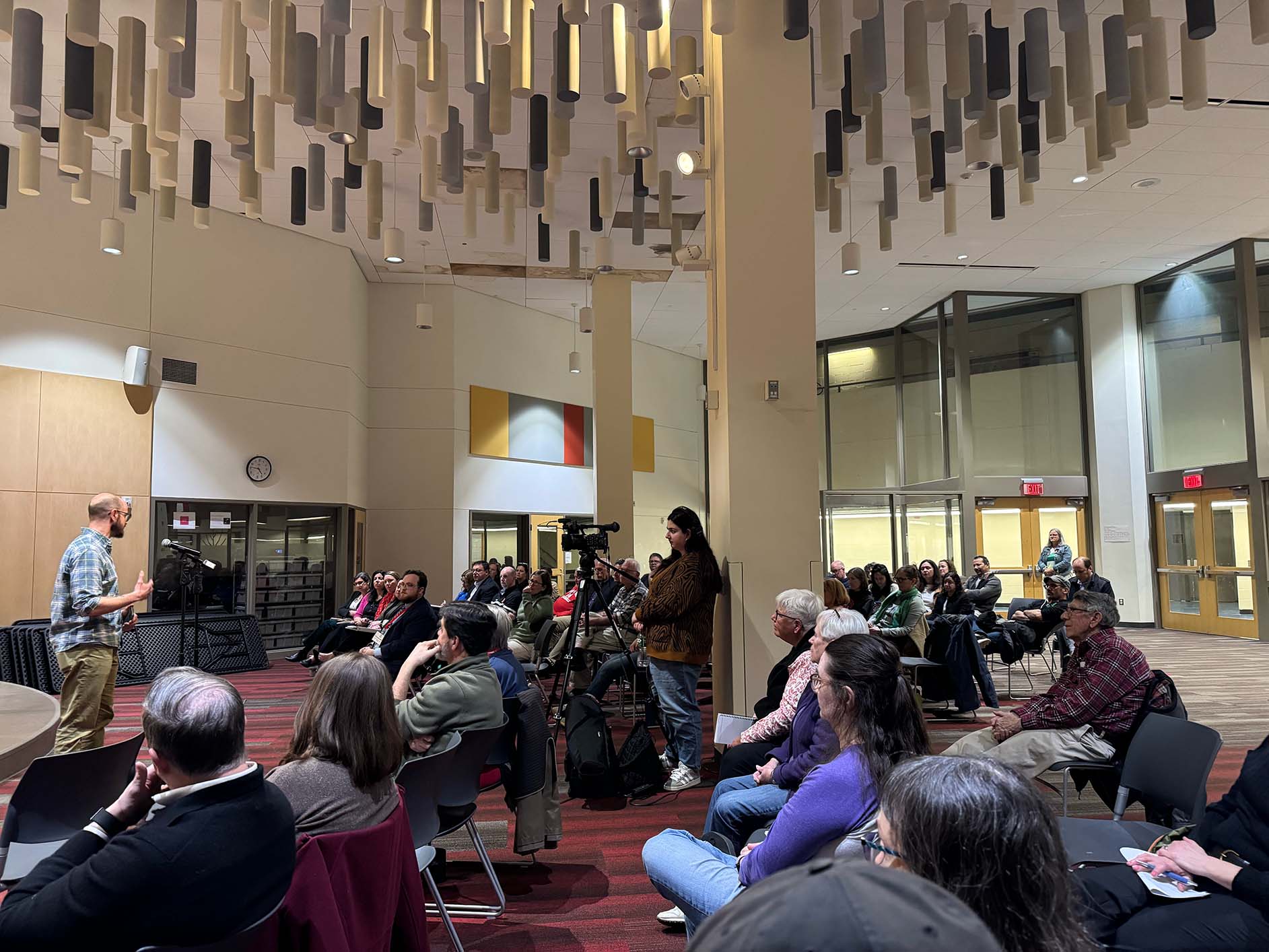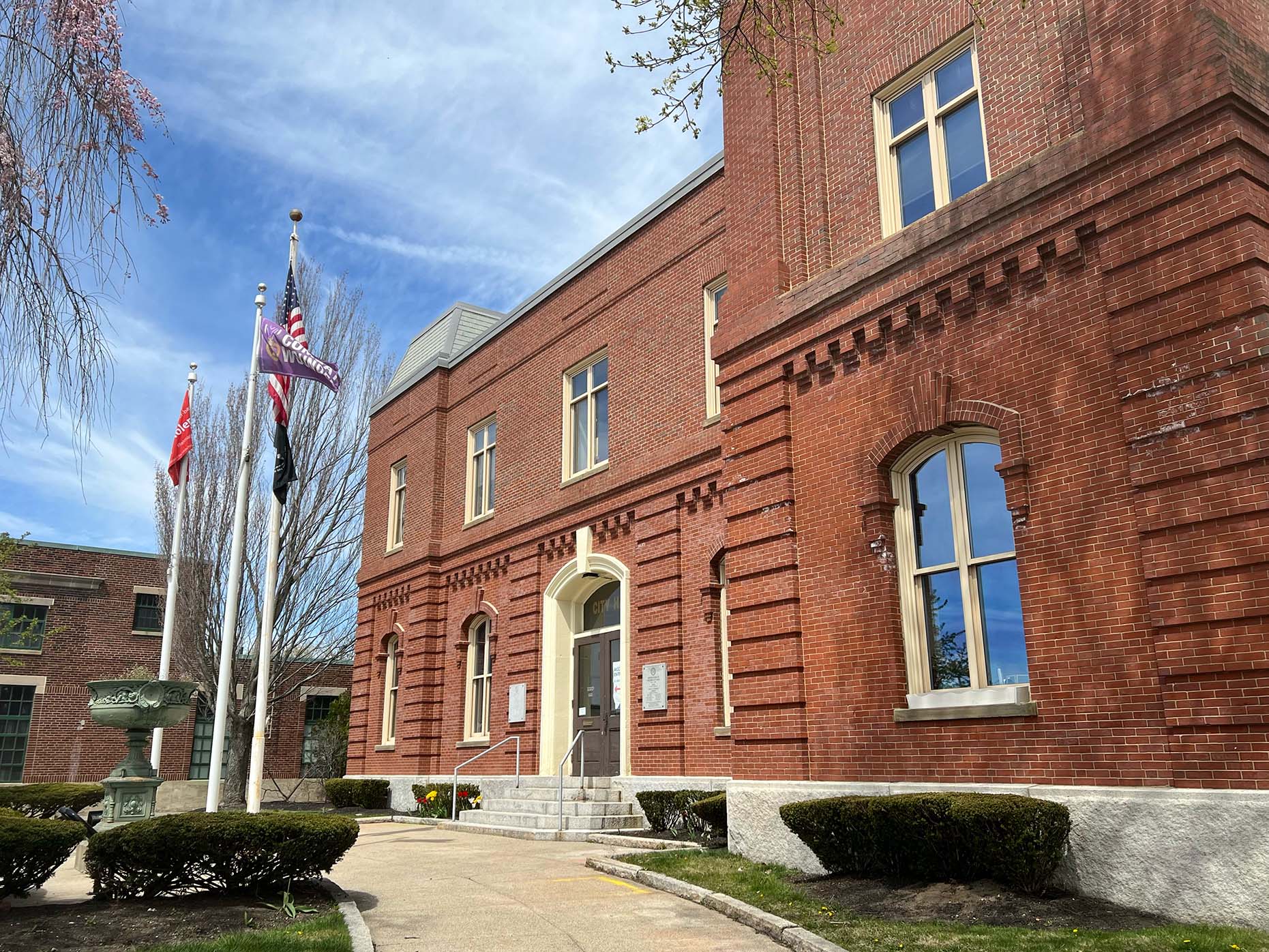Financial Task Force Hears Resident Opinions on Potential Override Vote
By Ellen Putnam

Resident, left, speaking at the Financial Task Force Public Budget Forum
Last week, the city’s Financial Task Force hosted a Public Budget Forum where residents could share their opinions about what they believe the city should prioritize in its spending, and on potential override questions the city might put on the ballot in November.
Earlier this month, Mayor Jen Grigoraitis convened the Financial Task Force, whose purpose is to “take in public feedback and develop potential revenue plans, including seeking a Proposition 2½ override question or questions on the November 4, 2025 municipal election ballot.” The Task Force is co-chaired by City of Melrose CFO and Auditor Kerri Golden and Melrose Public Schools Business Manager Ken Kelley. Its other members are: Superintendent of Schools Adam Deleidi; City Council President Leila Migliorelli; City Council Appropriations Chair Mark Garipay; School Committee Chair Dorie Withey; and School Committee Vice-Chair Jen McAndrew.
The City of Melrose is currently facing a $6.1 million budget deficit for Fiscal Year 2026 (FY26), which begins in July. The School Committee will be voting later this month on a budget for the schools that incorporates $4 million in cuts. In May, the City Council will hear from different city departments and vote on an overall budget that makes up the remaining $2.1 million in cuts.
“We are facing considerable financial pressures,” Mayor Grigoraitis said at the start of the town hall meeting, “because our fixed costs consistently outpace our revenue growth.”
“I want to be very clear,” she continued, “Melrose will incur significant cuts to our budget for FY26. There is no way out of these cuts because cities in Massachusetts are required by state law to pass balanced budgets, and last year’s override vote failed. We are doing everything we can to mitigate some of the pain for next year through creative budgeting. We are not alone in these circumstances, if that helps: these are deep-seated, structural budget challenges.”
Last June, an override vote that would have raised property taxes by $7.7 million was rejected by Melrose voters, 45% to 55%. In 2019, Melrose voters did pass a $5.18 million override. Other towns in the area, including Medford and Stoneham, have recently or are currently voting on property tax overrides due to similar budget pressures.
“We are considering an override question or questions for November,” Grigoraitis went on. “It’s an option that is utilized by cities and towns for citizens to decide how and if they want to invest in their communities. For voters to tell City Hall what their priorities are and how much they are willing to contribute in taxes to make those priorities a reality.”
What is a Proposition 2½ override?
Proposition 2½ was a statewide ballot initiative that passed in 1980. It prohibits towns and cities in Massachusetts from raising the total amount they collect in property taxes by more than 2.5% each year, plus an amount calculated to reflect new growth in the town (Melrose’s “new growth” figure this year will be $770,00).
Municipalities can “override” this limit with a citywide vote to increase the total amount of property taxes the town can raise by a specific amount. The override amount then becomes part of the total property tax base for the following year.
During the town hall portion of the meeting, twenty-two community members shared their priorities and concerns with members of the Financial Task Force.
Some speakers brought up comparisons to other towns in the region and in the state: “We are in the bottom fifteen school districts for per-pupil spending,” noted one commenter. “We’re at the absolute bottom of the barrel.”
While special education services are mandated by law, they may be at risk as well. “A lot of people don’t think about special education until you have a child that needs it,” reflected Amanda Cormier, the co-chair of the Melrose Special Education Parents Advisory Council (SEPAC), “and as much as you hear that special education won’t be touched because it’s required by law, the reality is different. Special education services aren’t provided in a vacuum. With larger class sizes and strained resources, students still may not get what they need.”
If students who are entitled to special education services can’t receive what they need in the Melrose Public Schools, the district is required to pay for their tuition in a different school district or at a private school, which is often much more expensive than educating that student in-district would have been. “I’m tired of this ‘penny wise, pound foolish’ approach to budget,” Cormier added. “When the most vulnerable benefit, we all benefit.”
“Do you want to keep my kid in the schools, or send them out of district to the tune of seventy or eighty thousand a year?” added Christie Charles Byrnes, the other SEPAC co-chair.
Mayor Grigoraitis has not yet released her proposed budget for the non-school parts of the city, but $2.1 million in cuts is likely to affect nearly every aspect of the city’s functions.
“Have you seen the roads?” asked one commenter. “When I bike, I’m playing Frogger around the potholes while I’m avoiding cars.” Speakers also brought up concerns about potential cuts to programming for seniors, the library, and public safety.
Budget shortfalls are not a new problem for Melrose. Gail Infurna, who served as acting interim mayor in 2018 and 2019, spoke at the town hall and said, “I know too well the budgetary constraints and the lack of revenue. I’ve been there, done that, and I don’t envy any of you.”
Commenters noted that, in contrast to several of our neighbors, Melrose has a very small commercial tax base. (Commercial taxes make up less than 9% of Melrose’s tax base, compared to 29% in Saugus and over 60% in Burlington.)
“We’re missing that commercial property,” said one speaker, “but we’re 4.7 square miles. How much commercial can you put in Melrose when you have all the homes we have? Do we want to turn the Fellsway into Route 1? That would be ghastly! Who would do that?”
“Melrose has always been a conservative city,” the commenter went on. “It’s not an overspending problem, it’s a revenue problem. Prop 2½ was supposed to discipline cities, not be a straitjacket.”
“Less than half the time since 1982, has 2.5% beaten inflation,” another commenter noted. “Every other year, the budget gets cut. We haven’t taken care of our house, and now it’s coming down around us.”
“I’ve heard people say we need to ask the hard questions of our politicians,” added another speaker, “but it’s not a lack of hard questions - we have hard issues.”

At the same time, speakers noted that rising costs and stagnating revenue are not just a problem for city budgets.
“My salary is not going up 3%,” emphasized one speaker, “I’m not getting gigantic raises. I can’t afford the override. I have to balance my budget, and I’m going to have to cut back on things.”
“Retirement used to be decades away,” reflected another speaker, “but it’s not, anymore. I’m trying to squirrel away funds, but I’m worried that I’m going to outlive my money. I’m just asking the city to be as responsible in its budget as I am in my own budget, and find different ways to do things.”
Melrose has programs that provide property tax relief for veterans and seniors, including a work-off program for seniors, but these programs don’t always provide enough tax relief for those who need it. Owning a home that has increased significantly in value over time, with property tax bills that reflect the house's market value, can create a conflict for some residents between staying in their home and selling it to achieve financial stability.
“How can we make this fairer?” asked one commenter, “How can we make it so folks who have the ability to pay more do, and take seriously the folks who have a hard time paying for these services but deserve to be a part of our community too?”
Multiple speakers referred to the need to plan ahead for future years, so that a potential override could support the city for longer than a year or two without the need for another ballot measure soon after.
“We need to prepare for the continuation of this environment where net new growth remains low and inflation remains high,” said one commenter. “We need to be aggressive. And we need to make decisions that future Melrosians will see as a step forward, not just a step sideways.”
But planning ahead is challenging, especially given the current uncertainty around federal funding. And costs are rising rapidly in many areas - the state’s Group Insurance Commission, for instance, just announced that health insurance costs will be rising 12% for FY26, or an increase from $14 million to $15.7 million in FY26.
The Financial Task Force can decide to include a single override question or multiple override questions on the November ballot, pending the City Council’s approval.
“I’m concerned,” said Byrnes, “that if an override goes through, it will ask for just enough money to put a band-aid on a severed limb, just to get people to vote for it, and then we’ll be back here again in a year.”
The Financial Task Force continues to accept feedback and input on the city’s budget for FY26 and possible override question(s) at budget@cityofmelrose.org.

Follow Us: